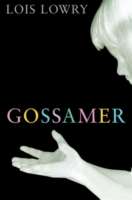
While learning to bestow dreams, a young dream giver tries to save an eight-year-old boy from the effects of both his abusive past and the nightmares inflicted on him by the frightening Sinisteeds.
- ISBN: 9780618685509
- Author: Lowry, Lois
- Published: 2006 , Houghton Mifflin/Walter Lorraine Books
- Themes: Dreams, Fear, Hope, kindness, Orphans
- Descriptors: Americas, Fantasy, Intermediate (ages 9-14), United States
- No. of pages: 144

Gail’s Take
I’m one of those people who vividly dreams—a lot. In my dreams I have choreographed entire ballets, carried on conversations in other languages, most often French (I only had two unsuccessful years of French in high school 40+ years ago), write picture books, visit with lost loved ones, and generally have exciting adventures. But once in a great while, I will have a nightmare. When I was a child, I had two nightmares that repeated themselves for years. One was of ants in my bed and one was of an escaped gorilla chasing me around and around our house. I would wake up terrified, in a cold sweat, and nothing could induce me to go back to sleep. These days, on the rare occasions I have a night terror, I wake up, make a note to myself, “Wow! That was scary,” and promptly go back to sleep. I also find I can sometimes direct my dreams; just before falling asleep, I’ll think about what I want to dream, and sometimes, just sometimes, that’s exactly what I dream. All of this got me thinking about books featuring dreams and one of my favorites is Gossamer by Lois Lowry (2006), a 2007 Notable Children’s Books in the English Language Arts.
From the moment I began reading this book, I was entranced. I wanted something like Littlest One to be looking out for me in my dreams, unraveling the threads of my good memories from the bad and weaving them together into delicate, satin dreams of peacefulness. And for me, the image of the Sinisteed worked–think memories of horse rides gone bad…. But for others, this starred review novel by Lowry does not work so well. Spisak (2006) describes Gossamer as “imaginatively created, with a lyrical and delicate style,” but goes on to say it is “heavy handed” and “the rescue drama is fairly hackneyed.” In all the reviews I read, those who did not like this read reflected similar sentiment to Spisak’s. I think it comes back, in part, to how willing the reader is to step into the author’s fantasy world.
And yet, Gossamer is not just a fantasy. It is also a very real look at the effects of abuse on relationships and children. John’s and his mother’s nightmares are the pieces of their life affected by his father’s abuse, the subsequent divorce, and starting over. One of the beautiful aspects of this book is how Lowry is able to take these dark pieces of life and “touch” them with lightness and hope. In careful prose, she juxtaposes the complications of life with details of the everyday. I like how Marie, in the Community Reviews of Goodreads puts it, “Lowry uses the term, ‘the jigsaw puzzle world of dreams.’ Sometimes our fears emerge, sometimes our loves; sometimes we are comforted, sometimes we are unnerved, sometimes entertained…. Certainly there are times in life that need a caring gossamer touch” (http://www.goodreads.com/book/show/12931.Gossamer).
Prisca’s Take
I’m always fascinated by people (like you, Gail!) who remember their dreams! Once in a while I’ll remember a good dream, but that is rare. What I do remember are my periodic recurring nightmares of someone chasing me to hurt me. I’ve always speculated those are related to some rough experiences earlier in my life. Even though it’s fantasy, reading Gossamer helped me think about and make sense of what dreams are and where they come from. I, too, so wished Littlest One was watching over me. If I have my nightmare again, I can imagine myself thinking of and vanishing Sinisteed and searching for Littlest One!
I love the concept of story in the book, too; how things we surround ourselves with each have a story, and how those things/stories are woven together in our lives and dreams. I was struck that Littlest One recognized the importance of sad parts too. She says “Sad parts are important…you must include the sad parts, because they are part of the story, and they have to be part of the dreams” (p. 105). Lowery doesn’t leave the impression that dreams are always happy or that sad dreams are equivalent to nightmares which to me is an important point. My take on it is that without the sad parts of life/dreams, we wouldn’t know and appreciate the happy/good parts.